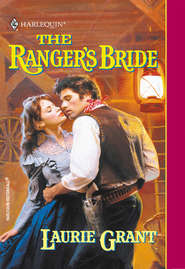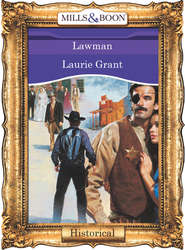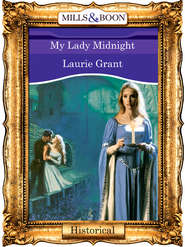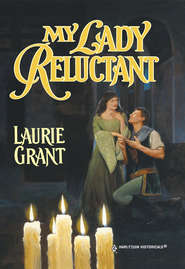По всем вопросам обращайтесь на: info@litportal.ru
(©) 2003-2024.
✖
Maggie And The Maverick
Настройки чтения
Размер шрифта
Высота строк
Поля
Garrick froze, remembering the day he’d come home from the war, just before Lee surrendered at the Appomattox courthouse. His brothers weren’t home yet, but his mother and his sister had put together a family celebration out of the meager food supplies they had. Cecilia just kept staring at him—at his pinned-up trouser leg—her eyes wide with fright in her pale face.
Later that night, when they’d gone up to the bedroom they shared in the Devlin family home, he’d tried to tell her how much he had missed her, how hers had been the name on his lips when the doctor, after giving him a little whiskey for an anesthetic, had hacked off the shattered lower portion of his leg. Shyly, he’d kissed her and asked if he could make love to her.
He had never had to ask before. She’d always been eager to participate in the marital act—almost too much so by Victorian standards, but he’d always loved her for it.
She’d told him to blow out the lamp—she who had always been excited to see the passion in his face. And then she’d just lain there, still as a marble statue and just as cold, and let him exercise his husbandly rights.
He’d been careful to be gentle and had tried not to touch her leg with the bandaged stump, but as he was withdrawing from her and preparing to lie on his back, the foreshortened leg had brushed her shin.
Cecilia had gasped as if revolted, and had then begun to cry, turning away from him and hugging the far side of the bed. He’d tried to comfort her, to apologize, but she’d just ordered him, in a tight little whisper, not to touch her again.
Garrick hadn’t slept until dawn was paling the skies, and he was pretty sure Cecilia hadn’t, either. When he’d finally awoke midmorning, Cecilia had gone. Later he learned she had not only left the farm, but had taken a stage heading south.
And over there, petting the friendly dog, was the result of that night, he realized. He stared at the boy, whose face he could see in profile.
His son. But suspicion remained. “When was he born?”
“I dunno the exact date,” the woman admitted with a shrug. “You read this here letter. She probably told you in it.”
He accepted the wrinkled, folded piece of paper as one might accept a dozing rattlesnake. But before he unfolded it, he paused. “All right, supposing he is my son…why now? He’s what—three years old? Why is she sendin’ him to me now?”
“Read the letter,” the old woman said. “There’s more to this here tale, but she said ya was to read it first.”
Realizing that the old woman wasn’t going to make it any easier, he gave up and unfolded the letter, holding it so that the bright noon sunlight made it easier to read.
Dear Garrick, I know I hurt you when I ran away. It was awful of me to treat you that way, after all you had been through in the war, but I just couldn’t help it. I guess I wasn’t strong enough and good enough to be the wife you deserved, and I’m sorry about that, but I just couldn’t be someone I’m not. I’m trying to make it up to you now by sending our boy. I know you won’t believe he’s yours, and I don’t reckon I blame you, but his birthday is New Year’s Day, 1866—which, if you count back, is nine months after you came home. I named him John Garrick. I know you hate me now, Garrick, and you have a right. But if you ever loved me, I hope you’ll be good to our son. I know he’ll be better off with you.
Cecilia
He read it through twice before lifting his eyes from the paper.
“It tells me his name and his birthdate, but it doesn’t tell me what I asked you. Why now? She’s had him for three years. Why is she sending him to me now? What’s she up to?”
The woman looked uneasily at the boy, then back at Garrick. “Bigamy, that’s what. I’m sorry to be the one t’tell ya that, but it’s the truth.”
“Bigamy? She’s married to someone else?”
“That’s what bigamy means, don’t it?” the old woman responded, adding a regretful tsk, tsk. “Yup, she’s Miz Cecilia Prentice—has been ever since soon after she showed up in Houston in ‘65 and started workin’ at the hotel. Pretty as a picture, she was. Men flocked ‘round her like flies around a picnic. It warn’t a week afore Will. Prentice up and married her and cut out the competition.”
“But she was—is,” Garrick corrected, “my wife! We were never divorced! How did she explain, uh, being in the family way to her new ‘husband’?” He felt his face flush; one didn’t discuss such delicate issues as pregnancy with a lady, even one who had brought him the news that his wife had committed bigamy.
The old woman chuckled again, a sound Garrick was growing to heartily detest. Nothing they were talking about was funny.
“Who knows? It’s the oldest trick in the book, fobbin’ off some other man’s child on a husband, ain’t it? You’d think a feller wouldn’t be dumb enough to think that big healthy baby was his, come early, but I reckon he was, ‘cause he used to be proud as a banty rooster of him,” she said, nodding toward the boy.
“’Used to be?”’ Garrick echoed. “What happened?”
“There was an accident…they was comin’ home from a barbecue one night. I was keepin’ the child for ‘em. A storm blew up and lightnin’ was flashin’, and the horse got skeered and run away with them. The shay overturned and Mr. Prentice was thrown clear, but Miz Cecilia, she was trapped under a wheel. She was hurt bad, and it looked like she might die on the spot. Anyway, I reckon she was afeered for her immortal soul, ‘cause she confessed to will Prentice that that boy wasn’t his.”
“Did she.did she.?” Garrick couldn’t bring himself to say the words.
“Did she die?” Martha Purdy finished the question for him. “No, but she’s been bedridden ever since. I take care o’her every day, her an’ the boy. Prentice told her he wouldn’t keep the boy under his roof any longer, not now that he knew the brat wasn’t his.”
Garrick felt his jaw drop as nausea churned in his stomach. He could no longer feel the burning hostility that had flamed up only moments ago toward Cecilia. Now he could only think of the cruelty Prentice had shown to the boy and his injured mother.
“I’ll keep the boy until his mother—” he couldn’t bring himself to name Cecilia just now “—recovers. Then I imagine she’s going to want to leave that sorry excuse for a husband, who won’t even keep the child he thought was his ever since he was born. And you can tell her that if she’s willing—” He was about to say that he’d take her back.
“Mr. Devlin,” the old woman interrupted, “you don’t understand. Cecilia ain’t gonna recover. Her back was crushed in the accident. She’s paralyzed—cain’t move from her waist down. She don’t hardly eat, and she gets weaker every day. She ain’t gonna make old bones, Mr. Devlin. The only way she’s gonna leave Prentice—” she glanced around, to make sure the boy was still entranced with the dog “—is by dyin’. And I don’t reckon it’s gonna be too long. She jest seemed t’lose what little will to live she had left when Prentice said the boy had to go.”
Garrick felt as if he were in the middle of a nightmare. This couldn’t be happening!
“But she wrote me that she was coming herself!” he protested. “She didn’t say anything about a child!”
The old woman sighed. “Mebbe she thought you wouldn’t take the boy iffen you’d knowed he was comin’, an’ mebbe she thought you wouldn’t turn him away once you seen your son’s face.”
Just this morning Garrick had been full of nervous but happy anticipation at seeing Cecilia again—and now she was dying?
“I—I’ve got to go to her—see her,” he mumbled, looking wildly about for the stagecoach driver, hoping the stage was going directly back to Houston. He’d be on it if it was, never mind that he’d be leaving without a word to his family and with nothing more than the shirt on his back.
Martha Purdy reached out a hand, as if she knew he wanted to go find the driver.
“She don’t want you to come, Mr. Devlin. She told me to tell you that, iffen you was to say somethin’ about comin’. She don’t want you to see her like that”
He stared at her, and she looked him right in the eye. “I’m tellin’ the truth, Mr. Devlin. Please don’t go all that way fer nothin’.”
He nodded, feeling cold all over despite the bright sunlight. “You’ll stay…for a while? Just till the boy gets. accustomed to me?”
“I can stay for a coupla days, and that’s only ‘cos the stage won’t be back this way till then,” the old woman told him. “Sooner I get back, the better. Prentice said he’d take care a’ Cecilia till I got back, but that man don’t know nothin’ about nursin’. He’ll forget to turn her, to make her eat.”
The image her words engendered, of Cecilia lying helpless on her bed, made Garrick close his eyes in horror. And she didn’t even want him to help her. “All right. I—I’ll get the wagon.”
Again the woman laid a restraining hand on his wrist, studying Garrick. “Ya know, he does kinda favor you, Mr. Devlin. His hair’s lighter’n yourn, but the eyes—oh, yes, he’s your boy, all right. Just look at him.”
She bent over and called, “Johnny, tell the doggie byebye and come say hello to Mr. Devlin.”
Garrick watched as the boy gave the dog a last caress and obediently came back to the old woman. He was thin as smoke. Garrick knew his mother would say he needed “feedin’ up.”
“Johnny, this is Mr. Devlin. Turns out he’s yore real papa, and he wants to meet you. Don’t worry, he don’t bite.”
The child jerked around, visibly trembling. “How kin he be my papa if my papa’s at home?” he piped in a childish treble.
It was possible. The boy could be his son, Garrick realized, staring at eyes that were as blue as his own. The lad’s hair was lighter, but then, his mother was a blonde, so maybe that affected such things. But it was the mouth that made Garrick think maybe the letter hadn’t been a pack of lies, after all. The boy had sensed he couldn’t be sure of his welcome, and to Garrick, the stubborn set of his lips was like looking at his own mouth in the mirror.
Garrick knew he should kneel down, so that he wasn’t staring at the child from such an intimidating height, but although kneeling was possible with his Hanger leg, it was awkward at best. And he’d just as soon not frighten the boy any more than he already was.
“There was a mistake, Johnny. Everyone thought William Prentice was your papa, but this letter tells me I am,” he said slowly, nodding toward the refolded paper. “Your mama wrote it, and in it she asks me to look after you for a while, till she’s feelin’ better. I didn’t know I had a little boy till I read that letter, you know.”
“You didn’t?” The boy’s eyes grew rounder. “Why?”











